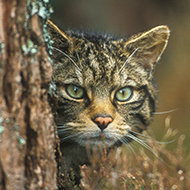
Scottish government grants £400,000 to save wildcat population
The Scottish government has granted a £400,000 funding boost to Saving Wildcats, a project that aims to prevent the extinction of the critically endangered Scottish wildcat.
Spearheaded by the Royal Zoological Society of Scotland (RZSS), the project aims to revive the population of wildcats in Scotland by breeding them and releasing them into the wild, after a report published by the International Union for Conservation of Nature's Cat Specialist Group concluded that there was no longer a viable wildcat population in Scotland.
The COVID-19 pandemic impacted the funding for the project, as the pandemic forced closures of Highland Wildlife Park and Edinburgh Zoo, which cost the RZSS over £1.5 million.
Dr Helen Senn, head of conservation and science programmes at RZSS, said: “Every visit to Highland Wildlife Park and Edinburgh Zoo supports our work to protect threatened species around the world, including on our doorstep in the Cairngorms National Park. The past year has been an incredibly difficult time for our charity, with the closure of our parks for a total of five months cutting off our main source of income.”
Alongside the £400,000 funding, the Scottish government has also provided the RZSS with an additional grant of £278,000 from their zoo and aquarium conservation fund.
Dr Senn said: “While we still face significant financial pressures, this £678,000 Scottish Government funding to help protect native species and support our work with partners is very welcome.”
The project is a partnership between RZSS, NatureScot, the Cairngorms National Park Authority, Forestry and Land Scotland, alongside European partners Norden's Ark from Sweden, and Spain's Junta De Andalucia, which have successfully revived the Iberian lynx species.
The six-year project, supported by £3.2 million of EU funding, alongside a wide-variety of co-funders and partners, aims to release the first wildcats from the project in 2023 with potential locations being explored in the Cairngorms. “Releasing carnivores to the wild is incredibly complex but we are planning to release the first wildcats in 2023, which will be very exciting,” said Dr Senn.
Dr Jo Judge, CEO of the British and Irish Association of Zoos and Aquariums (BIAZA), commented on the funding, saying that: “It is fantastic to have Scottish Government supporting the ground-breaking work of Edinburgh Zoo and Highland Wildlife Park. The proposed reintroductions are the culmination of decades of work conserving this species, including breeding, education and scientific work with many zoos and other partners working together.”
“The iconic Scottish wildcat is on the very brink of extinction, but with support we can avoid a future without wildcats”
More information about the project can be found at savingwildcats.org.uk/get-involved/
Image (C) RZSS



 The Animal and Plant Health Agency (APHA) has updated its online reporting service for dead wild birds.
The Animal and Plant Health Agency (APHA) has updated its online reporting service for dead wild birds.